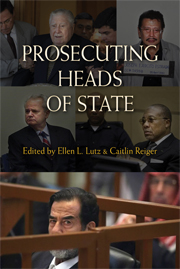Book contents
- Frontmatter
- Contents
- List of Contributors
- About the International Center for Transitional Justice
- Foreword
- Preface
- 1 Introduction
- 2 Prosecutions of Heads of State in Europe
- 3 Prosecutions of Heads of State in Latin America
- 4 The Multiple Prosecutions of Augusto Pinochet
- 5 A Leader Takes Flight: The Indictment of Alberto Fujimori
- 6 Charm and Punishment: How the Philippines' Leading Man Became Its Most Famous Prisoner
- 7 Shifting Legitimacy: The Trials of Frederick Chiluba
- 8 A Justice “Trickle-Down”: Rwanda's First Postgenocide President on Trial
- 9 Justice Squandered? The Trial of Slobodan Milošević
- 10 A Big Man in a Small Cell: Charles Taylor and the Special Court for Sierra Leone
- 11 Political Pedagogy, Baghdad Style: The Dujail Trial of Saddam Hussein
- 12 Conclusion
- APPENDIX: List of Prosecutions of Heads of State or Government since 1990
- Selected Bibliography
- Index
2 - Prosecutions of Heads of State in Europe
Published online by Cambridge University Press: 06 August 2009
- Frontmatter
- Contents
- List of Contributors
- About the International Center for Transitional Justice
- Foreword
- Preface
- 1 Introduction
- 2 Prosecutions of Heads of State in Europe
- 3 Prosecutions of Heads of State in Latin America
- 4 The Multiple Prosecutions of Augusto Pinochet
- 5 A Leader Takes Flight: The Indictment of Alberto Fujimori
- 6 Charm and Punishment: How the Philippines' Leading Man Became Its Most Famous Prisoner
- 7 Shifting Legitimacy: The Trials of Frederick Chiluba
- 8 A Justice “Trickle-Down”: Rwanda's First Postgenocide President on Trial
- 9 Justice Squandered? The Trial of Slobodan Milošević
- 10 A Big Man in a Small Cell: Charles Taylor and the Special Court for Sierra Leone
- 11 Political Pedagogy, Baghdad Style: The Dujail Trial of Saddam Hussein
- 12 Conclusion
- APPENDIX: List of Prosecutions of Heads of State or Government since 1990
- Selected Bibliography
- Index
Summary
Europe has had a long tradition of calling for criminal prosecutions of senior officials for grave crimes committed while in office. Since the end of the Cold War, the “justice norm” has become further embedded. Europeans' willingness to try their own leaders is illustrated in several lines of cases: (1) the prosecutions of aging former Nazi officials for crimes they committed during World War II; (2) the prosecutions of former Eastern European leaders for Cold War–era crimes; (3) the Slobodan Milošević trial (and related trials) in the International Criminal Tribunal for the former Yugoslavia and subsequent domestic and international trials of perpetrators involved in war crimes and crimes against humanity in the former Yugoslav countries; and (4) the prosecutions of heads of state and other top government officials on corruption charges. In addition, Western European countries have opened their courts to trials of perpetrators of genocide, crimes against humanity, and other serious human rights violations from Argentina, Chile, the former Yugoslavia, Rwanda, and numerous other countries. Almost all of the countries of Eastern and Western Europe are members of the International Criminal Court (ICC) and to regional and international human rights and anticorruption treaties; in addition, most have conformed their domestic legislation to the ICC statute's provisions.
EUROPEAN ANTECEDENTS TO CONTEMPORARY TRIALS OF POLITICAL LEADERS
Even before the end of World War I, there was intense Allied interest in trying German leaders responsible for war crimes.
- Type
- Chapter
- Information
- Prosecuting Heads of State , pp. 25 - 45Publisher: Cambridge University PressPrint publication year: 2009

